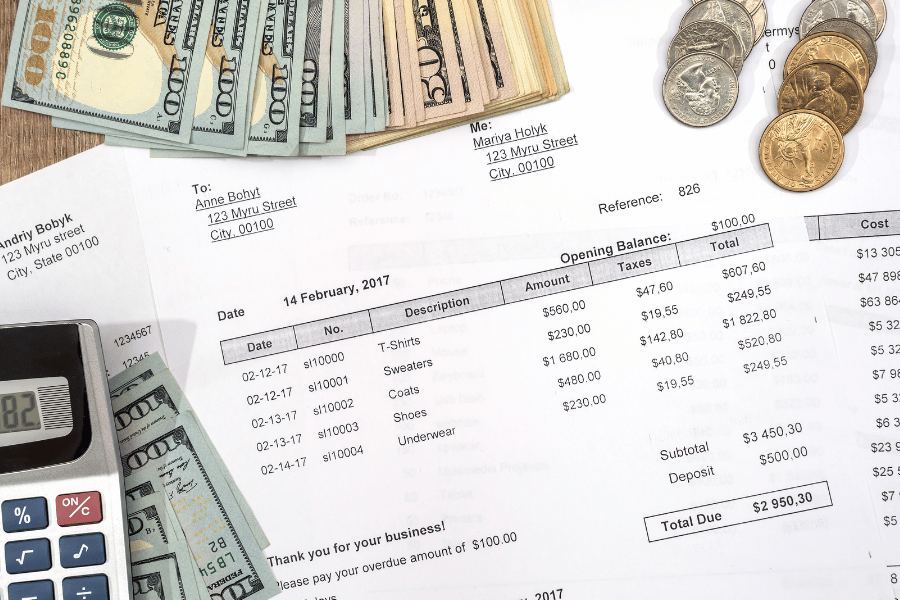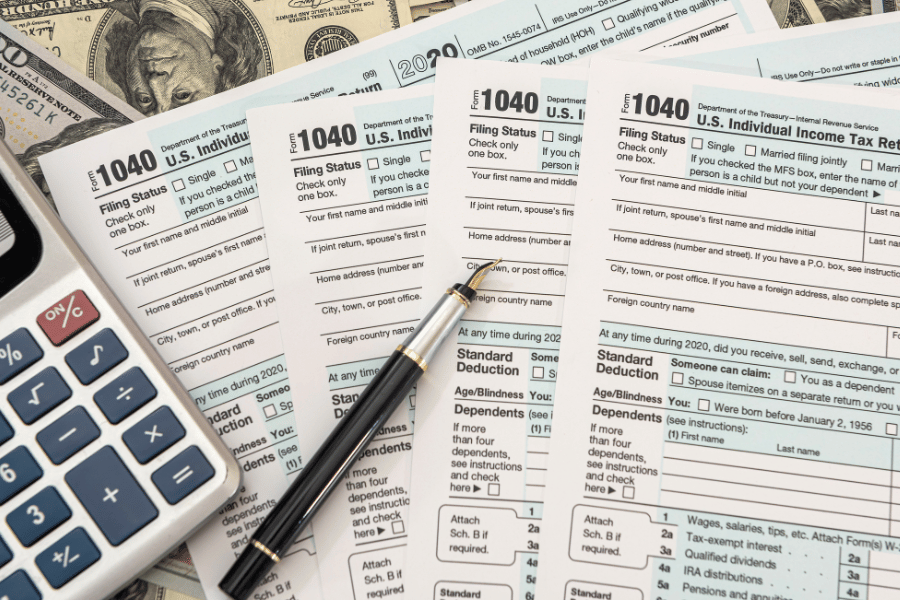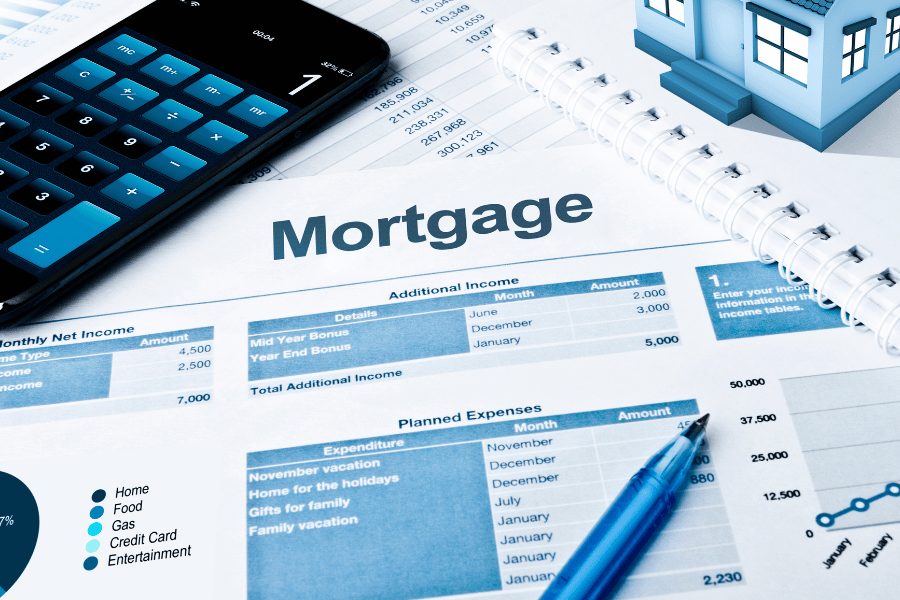Mortgage Income Requirements [2024]
Are you interested in buying a house soon and want to know what the mortgage income requirements are? Keep reading to learn more about mortgage income requirements in 2024.
Home buyers need to meet certain criteria to get a home loan, but no minimum income is required for mortgages. There are minimum credit scores, employment requirements, and others, but many first-time home buyers do not know that there is actually no minimum income required to buy a home.
You must earn enough money to qualify for a certain amount of loan, and the money you earn must be an acceptable type of income. Your credit score and the size of your down payment also play a large role in whether you qualify or not.
From conventional to government loans, many different types of mortgages offer something for everyone. While there is no standard income to qualify, you do need to be able to pay off that loan. Keep reading to learn more about what you should know about incomes and requirements for mortgages in 2024.
Here is what you need to know about mortgage income requirements in 2024.
1. Mortgage Income Requirements

As stated above, there is no minimum income required for mortgage approval. Home buyers of any income level can qualify for mortgage loans. The one thing to keep in mind is not how much money you earn but that your income meets a few key requirements.
Lenders just want to know if you can afford the mortgage, so that means you need to prove you have enough income to cover future monthly payments. Outside of the basic criteria, income requirements for a home loan are fairly flexible. Most types of incomes can qualify, from salaries to commissions to self-employment.
Here are some income requirements for a mortgage:
- Need a reasonable debt-to-income ratio - usually 43% or lower
- You must have been earning a steady income for at least two years
- Your income must be expected to continue for at least three years
Reliable Income:
Your annual income must be reliable and stable. Most loans last 30 years, so you need to prove a steady cash flow and the ability to make the loan payments over time.
Most home loan programs require two years of consecutive employment and consistent income either with the same employer or within the same field. Stability is a sign showing your annual income will likely remain reliable for at least three years after buying a home.
There are exemptions to the two-year rule, so depending on your profession, there may be exemptions. Ask a professional if this falls into your category.
Debt-to-Income Ratio:
One way lenders will determine whether or not affordability is by looking at your debt to income ratio. Your DTI compares your previous monthly debt payments with your mortgage gross income. This will show them how much money you have left over every month for a mortgage payment.
They look at debt in two ways...
- Front-end ratio: Calculates housing costs (like mortgages) as a percentage of pre-tax income
- Back-end ratio: All debt payments (housing cost, credit card, car loans) relative to income
2. Types of Incomes
Lenders can and will approve loans for people from all sorts of different incomes. However, each of these types of income must meet certain criteria to qualify for a mortgage application. Below are some types of income.
Employees (salary/hourly)
Employees use the income they receive, whether it is from salary, hourly wage, commission, or overtime, as well as restricted stock unit income and bonuses for mortgage qualifying. You must provide your most recent paycheck stubs, W-2s, and tax returns from the past two years as well as your income must be consistent over two years.
To use commissions and overtime as well as bonuses for qualifying, you must show evidence of this income continuing for two to three years post-closing as well as written confirmation from the employer.
Freelancers and Self-employed
Freelanders and self-employed people included independent contractors, gig workers, and business owners. Getting a mortgage for these types of loans can be harder, but it is possible.
Self-employed income can fluctuate over time, so you must provide your complete tax return from the past two years, and your annual income must remain the same or increase during the last two years.
A decrease in your income should be fine, but make it aware to your lender that your income is typically a certain average. Be mindful that many business deductions on your tax return may reduce your qualifying amount, too.
Other Smaller Types
- Dividend Income: Must be regular and must show a two-year history of receiving dividends
- Social Security Income: Must continue for at least three years post-closing
- Retirement Income: Income must continue for at least three years post-closing
- Alimony and Child Support: Must receive regular payments for at least 6-12 months prior to the mortgage, and the payments must continue for at least three years post-closing.

3. Income Limits
Some mortgage programs do have income limits, meaning you can not exceed a certain percentage of the area's median income to qualify. However, standard conventional loans, VA loans, and FHA loans do not have limits, but household income limits are typical with USDA loans.
Many down payment assistance programs also have income limits, but these will vary depending on the program. Typically, income can not go over 100% to 115% of the median area income.
USDA loans can not exceed 115% of the area's income, Fannie Mae's HomeReady must remain below 80% of the area's median income, and the Home Possible must be under 80% as well.
4. Low-Income Loans
Low-income home loans are designed to help people and families with lower incomes afford a home. These loans tend to come with lower interest rates, reduced down payments, and more flexible qualification requirements. Government agencies typically are behind these, which lowers the risk.
Here are some benefits of low-income mortgages:
- Lower down payment
- Flexible credit requirements
- Reduced interest rates
Low-income loans are ideal for people who do have a steady income but find it challenging to save for a large down payment or qualify due to their income level. Here are some low-income home loan options.
| Loan Type | Credit Score Requirement | Down Payment | Info |
| HomeReady Loans | Varies | As low as 3% | Offered by Fannie Mae. Must complete online homeowner education course |
| Conventional 97 Loans | At least 620 | As low as 3% | Must be for a single-unit primary residence |
| FHA Loans | At least 580 | As low as 3.5% | Have the backing of the Federal Housing Administration |
| VA Loans | Varies | None | For veterans, active duty, and their families |
5. Other Requirements
You should know that lenders take other factors into consideration when applying. Here are some other requirements you should be aware of.
Credit Score
Most mortgages have a minimum credit score requirement. Conventional loans require a 620 FICO score, FHA loans require a 580 minimum, VA loans require 580-620, and USDA requires a 640.
Down Payment
The size of your down payment affects the amount you can qualify for. Many people who put down more significant down payments have greater purchasing power.
Credit History
Your recent credit history is essential when qualifying. Most programs do not allow more than one 30-day late payment within a year.
Debt Load
Too many existing debts also reduce purchasing power. Paying down a car loan or student loan can increase affordability.
Assets
You need enough cash saved to cover a down payment and closing costs. Many lenders want to see "cash reserves" as well, meaning how much money you will have left to cover 2-6 months of mortgage payments if you have no income.

6. Incomes for Different Mortgage Amounts
Mortgages can seem scary, but understanding the income requirements for different mortgage amounts can help with this process. Below are some rough estimates based on credit scores and specific terms.
| Mortgage Amount | Estimated Annual Income Required |
| $200,000 | About $50,000 |
| $300,000 | About $75,000 |
| $400,000 | About $100,000 |
| $500,000 | About $125,000 |
Estimate your monthly mortgage payment with a mortgage calculator.
7. Approval Tips

When it comes to getting a mortgage, your income is, of course, a key factor. If your income does not qualify for these requirements states, here are some ways to help improve your income for mortgage approval.
- Increase your earnings: Ask for a raise, look for overtime, side hustles, or get a second job
- Lower your debt: Calculated by dividing your monthly debt payments by your gross income. Paying down these will improve the ratio
- Save for a larger down payment: The more money you put down, the less you will borrow, and it will make it more appealing to lenders
- Boost your credit score: This will lead to better mortgage terms, make the mortgage more affordable, and increase the amount you can borrow
- Consider a refinance: Refinancing can possibly lower monthly payments, freeing up more income
Methodology
We used information and data from several different sources and our own data to create this guide about mortgage income requirements in 2024. Most of the data was sourced from the following sources:
Above are a few sources that we used to gather most of our information about understanding mortgage income requirements.
FAQS
What are the income limits for Fannie Mae 2024?
Fannie Mae sets the HomeReady income limits for borrowers nationwide. You cannot make more than 80% of your area median income to qualify.
How much house can I afford if I make $120,000 a year?
Assuming you have enough to cover a down payment plus more for upkeep and that you do not have other monthly debts, you should be able to afford a home of $470,000 on your salary.
What is the maximum debt to income for Fannie Mae?
For Fannie Mae, the maximum total DTI ratio is 36% of the borrower's stable monthly income. The maximum can be exceeded up to 45% if the borrower meets the credit score and reserve requirements.

Mortgage Income Requirements [2024] - The Bottom Line
Many factors determine whether you qualify for a home loan. Your mortgage lenders will look at your financials to find the perfect limit for you. Mortgage approval isn't the same for everyone, so having an expert help you out is beneficial.
Since there is no required income, buying a home is about affording the monthly payments based on the loan size and interest rates. Many other factors go into mortgages and loans, so understanding which one you have is important.
If you are looking to buy a home soon, start by organizing your finances and asking yourself the right questions. For most people, the down payment is the main obstacle that keeps them from buying a house, so make sure you know what you need to help the process.
If you are lost in the mortgage world, no worries; get ahead of a local agent or a lender for help through this process. Mortgages should not be scary, and once you understand it, your life will be much easier when saving and buying a home.
If you are considering moving or selling, contact us or visit our website. Our team at Raleigh Realty is here to help you with any home buying or selling needs.
![Mortgage Income Requirements [2024]](https://images.agentloft.com/rr-images/uploads/rr-migrated/blogs/March2024/kK1evJi0zZcE5f2ZBTE0.png)



![North Carolina Mortgage Rates [2024]](https://images.agentloft.com/rr-images/uploads/rr-migrated/blogs/March2024/8ODOY5yVZtvdgRF6jZBz.png)